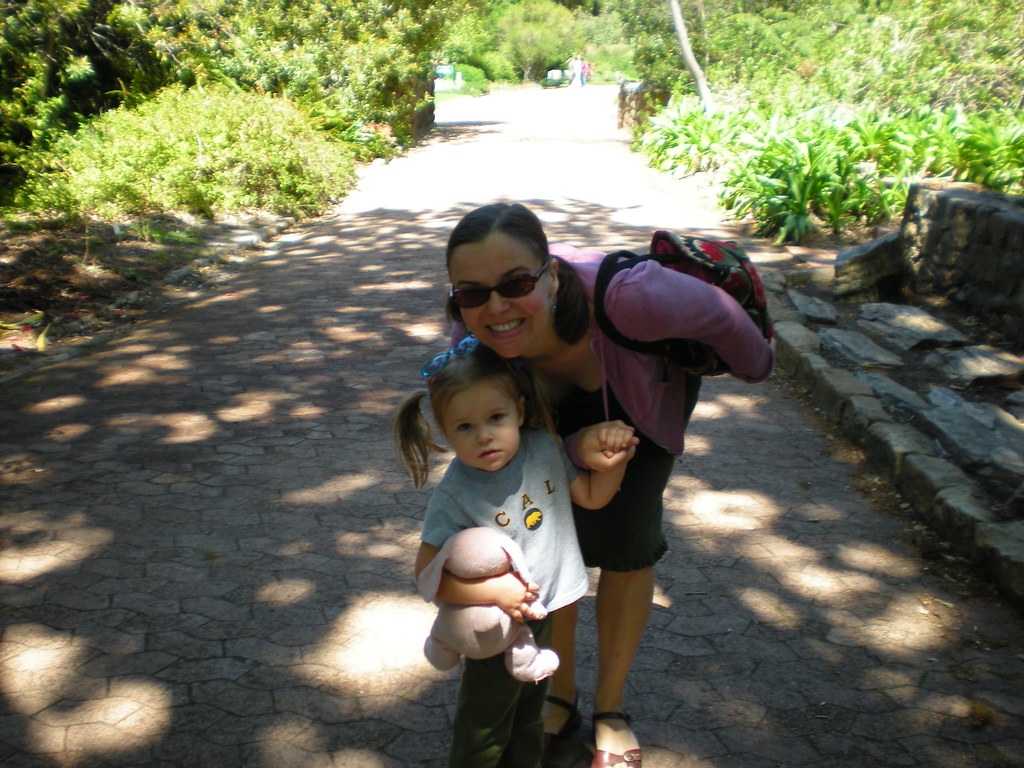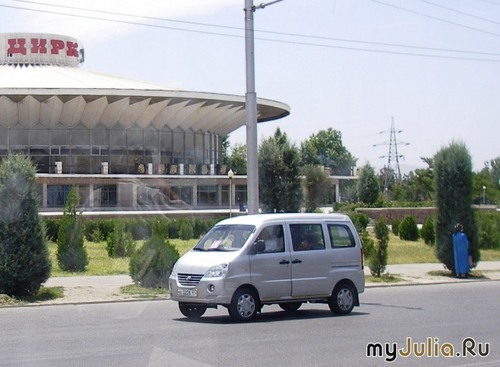
We took a trip to the north of Tajikistan for the first part of last week, to the city of Khujand. Dan and his colleague were going for work, and it seemed like a good (who knows, maybe already the last?) chance to tag along under such circumstances (hotel room paid for, ground transportation already planned and covered, etc.) and see something new.
So Anya and I got up early on Monday morning and went to the domestic terminal with the guys, sat in the chilly waiting hall, let ourselves be bussed out to the plane -- a frighteningly ancient (1970s vintage?) prop plane, an An-24 I guess. But the flight took only 50 minutes, so we didn't have too long to sit there and wonder how it was that this plane was flying so successfully.
The trip as a whole was a lot of fun, but it does make me marvel at the difference between traveling with a pre-schooler and either traveling alone or with someone older than about 8. It's just funny how slow you move, how much less you do each day (especially when a handful of prime hours are spent inside for napping!), but also what a different perspective you get on everything you see and experience on a trip where your main companion is 3.
As we've done in other provincial cities in the former Soviet Union, we stayed in the hotel's luxury suite -- not exactly the Four Seasons, but not too shabby nonetheless. Two rooms, one of which had a crazy contemporary sofa set with accessory pillows -- 1 round, 1 star-shaped -- that entertained Anya half of the time we were there. About a 100-degree curve of plate glass windows in the corner of the room, covered with curtains that entertained Anya for the other half of the time we were there. A jacuzzi tub that leaked and didn't have the water pressure to fill it in our lifetime. (Similar to another provincial hotel experience in Khabarovsk, Russia.) No honor bar, but a plates of dried apricots and a plate of pistachios left in the fridge (undoubtedly by another guest, but who's to say, really?). A big screen plasma TV that got Russian music videos and BBC World. What more could you really want?
The first day was cloudy but no precipitation. We checked in after our midmorning arrival and headed in our separate directions: Dan and colleague to work meetings, Anya and I to explore the town. Hotel Vatan was located really centrally, just a 5 minute walk to Khujandi Theater and the Sugd regional history museum. We used the clear weather to explore outside, since we'd heard the next 2 days would bring rain and/or snow. We forced ourselves to stop after a snack of several "healthy cookies" and get outside, walking past the theater and north along the "alley" park leading up to the Syr Darya river. Stopped at a park bench to have a mandarin orange and pick up some leaves. Strolled up to the river while singing several verses of "Old MacDonald Had a Farm."
Turned to admire the defunct Leninobod hotel building and what is billed as the largest Lenin statue in Central Asia (from afar). Turned along the river and up Lenin Boulevard to look for a cafe for lunch. Found a cafe in the Youth Palace (Dvorets molodezhi or Qasri javonon) where we had noodle soup, a breaded cutlet, and green tea. Got along famously with the friendly waitress, who addressed us in Russian but with the funny addition of a markedly northern Tajik question suffix tacked onto her sentences. This was also the lunch where Anya learned to love green tea out of Central Asian piyola teacups (the ones that are just like little bowls, without handles).
Then headed back to the hotel for a little bit of play and a nap!
And essentially that is where the sightseeing ends on any particular day, since Anya generally sleeps from 2-4:30, and by that time the sun is going down already. We went out for dinner with a friend from Dushanbe who was also in town and, as they say in the Madeline book, "that's all there is, there isn't any more."
On Day 2 we were planning to go with Dan and colleague an hour's drive away to the nearby city of Istaravshan, another city with over two thousand years of history behind it and reportedly a really interesting place to see, but since it was raining and we move so slow (and it wasn't clear how we'd get back midday for the nap), we decided to take it easy and remain in Khujand proper.
 The highlight of the day was the regional history museum. This is a prime example of what I mean by the amazingly different perspective you get when your traveling companion is a 3-year-old. Anya's favorite part was the section where the floor was made of plexiglass and in the 3 or 4 inch space beneath it was basically a model of an archeological dig: sand and shards of pottery, pieces of wooden beams, gold coins, metal vessels and old shoes, etc. We spent a long time there trying to guess what the various artifacts were. So much time that I couldn't drag her away to look at anything else and finally got bored of it myself. So with some difficulty I bundled us out the door and across the square to another cafe for some homemade pelmeni (tushbera in Tajik; basically meat-filled dumplings), more green tea, and the very tasty Khujandi kulcha (small round flatbread bread loaves made with a touch more oil than regular Tajik naan).
The highlight of the day was the regional history museum. This is a prime example of what I mean by the amazingly different perspective you get when your traveling companion is a 3-year-old. Anya's favorite part was the section where the floor was made of plexiglass and in the 3 or 4 inch space beneath it was basically a model of an archeological dig: sand and shards of pottery, pieces of wooden beams, gold coins, metal vessels and old shoes, etc. We spent a long time there trying to guess what the various artifacts were. So much time that I couldn't drag her away to look at anything else and finally got bored of it myself. So with some difficulty I bundled us out the door and across the square to another cafe for some homemade pelmeni (tushbera in Tajik; basically meat-filled dumplings), more green tea, and the very tasty Khujandi kulcha (small round flatbread bread loaves made with a touch more oil than regular Tajik naan).Day 3 it did snow -- wet and sloppy. After much cajoling I talked Anya into going out of the hotel for a shopping trip to find the teapot that she claimed Bear needed to have for a birthday present. We stopped in all the toy stores between Hotel Vatan and the main market square of the city, admiring all the fun things on offer.
 It seemed to me like there was more mid-level consumer-oriented commerce in Khujand, and these stores were a good example. I guess we don't spend a lot of time seeking this stuff out in Dushanbe, when we're not on vacation, but it still seems to me like in Dushanbe you either have bazaar-based commerce and items that are pretty cheaply made and sold, or you have super-fancy storefronts where you wonder who on earth really shops there. In Khujand I saw a lot more middle-of-the-road shops (and even well made commercial signs all over the place, very consumer-oriented) that seemed to hold things that people really want and can afford to buy.
It seemed to me like there was more mid-level consumer-oriented commerce in Khujand, and these stores were a good example. I guess we don't spend a lot of time seeking this stuff out in Dushanbe, when we're not on vacation, but it still seems to me like in Dushanbe you either have bazaar-based commerce and items that are pretty cheaply made and sold, or you have super-fancy storefronts where you wonder who on earth really shops there. In Khujand I saw a lot more middle-of-the-road shops (and even well made commercial signs all over the place, very consumer-oriented) that seemed to hold things that people really want and can afford to buy.We had a lot of fun looking at a flock of birds in the bazaar square and then tramped around the inside of the bazaar for a bit, me trying to surreptitiously buy a small collection of trinkets to serve as the small gifts in a makeshift Advent calendar once we got home. Along the way we finally found the child's umbrella that Anya has actually been suggesting that we buy her for over a month now -- the first thing she has so specifically asked for in her life -- and the plastic tea set for Bear. Then we hopped in a taxi and made it back to one of the more famous restaurants in town (Zaituna) in time to share Khujandi rice plov (raisins and dried currants seemed to me to be the difference in the north) and more green tea with Dan and his colleague.
A nap and some packing later and we were on the road to the airport. By the time we got through check-in it was driving snow outside, and I was somewhat concerned about the flight, despite the fact that we could see from the airport waiting hall that we would be flying in a newer and more substantial Boeing this time. But I guess they make this flight several times a day and often in snow, so it actually turned out very smoothly, thanks to Tajik Air's pilot. Made it back home to Dushanbe in time for a book and bedtime!




























